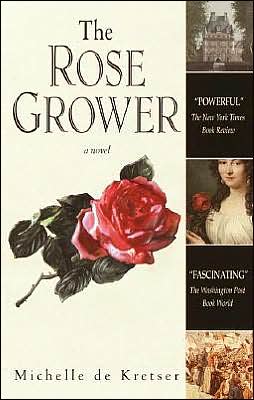

 |

|

The average rating for The Rose Grower based on 2 reviews is 5 stars.
Review # 1 was written on 2018-04-04 00:00:00 Adam Hiltebeitel Adam HiltebeitelDe Kretser writing in a different mode here than her more recent work. This is a lush, nuanced portrait of five years of the French Revolution as happening to a family. It moves at its own pace; it is completely gorgeous. |
Review # 2 was written on 2016-11-30 00:00:00 Pablo Pablo Pablo PabloReviewed here: You may not know this, as I haven't blogged about the nonfiction books I've read about it here, but I'm fascinated by the French Revolution. Two of my favorite fictional portrayals of that event are Victor Hugo's Quatrevingt-treize and Hilary Mantel's A Place of Greater Safety. Now I can add Sri Lankan-Australian author Michelle de Kretser's The Rose Grower to that list. The Rose Grower takes place in a small town in Gascony, where a liberal aristocratic family, an American artist, and a doctor active in the revolution interact with unexpected consequences. It's written in a beautiful omniscient, like both of the other novels I mentioned, though closer in tone to the intimacy and complicity of A Place of Greater Safety than to the grandeur of Quatrevingt-treize. It sometimes directly addresses the reader, saying of one character, "Think carefully before you dismiss him as wrong or foolish." Which is a good bit of advice about the period generally. My favorite parts of the book focused on the doctor, Joseph Morel, who is a deeply good person without being overly perfect, a difficult balancing act for the author (she doesn't quite manage the same trick with his love interest and co-protagonist, Sophie). He's snaps at people unfairly, gets lost in his own happiness to the point of losing track of others, and is easily manipulated by the offer of friendship. Nevertheless, he's honorable and selfless. When, following a provincial equivalent of the September Massacres, he's on the point of falling out with his fellow revolutionaries, who don't seem terribly upset about the murders, they offer him a chance to improve the local hospital. "They knew better than to offer him the world," as the narrator puts it, "So they offered him the chance to improve it." Unfortunately, easily manipulated as he is, he doesn't realize he's been used until tragedy strikes. Setting the story in a small provincial town rather than Paris allows for the worst aspects of the revolution to be the work of a single villain, a total sociopath whom no one sees for who he really is until it's far too late. This would be totally implausible as an explanation of what went wrong generally, and the author does show a larger problem as the tribunal's jurors condemn people for minor acts of dissent, but it works as a compelling and believable plot in the environment of a single town, and makes for a tense lead-up to the climax. Kretser also has a realistic way of showing the hypocrisies of the time even in her sympathetic characters-the artist Stephen and his lover end up living on a plantation as slave-owners despite Stephen's liberalism. This isn't because they're evil or uncaring people, but it's a refusal to make the characters completely modern or even the best examples of their time. Joseph Morel by the end seems to have abandoned, for understandable reasons, the efforts at large-scale improvement of conditions that he undertook earlier. In his new town, the narrator notes from his point of view, "People starve here," and it's not clear what he's doing about it beyond being a good doctor. Despite this, the characters are loveable. I had a few bones to pick with minor historical details- the position of nuns during the revolution, the portrayal of women's revolutionary societies, the description of why the Girondins fell-but the historical background is basically accurate despite relying on Simon Schama's flawed Citizens (I should note that I never actually made it through Citizens, but a variety of sources lead me to believe that it is not exactly a great work of history). I highly recommend this book to anyone interested in the period, or anyone just looking for a well-written, heartbreaking story. |
CAN'T FIND WHAT YOU'RE LOOKING FOR? CLICK HERE!!!